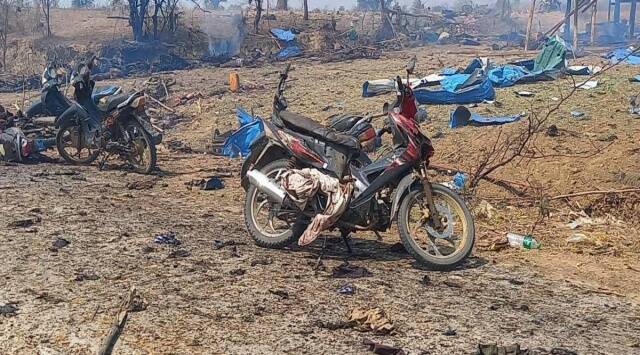An airstrike attack by the Myanmar military on a civilian crowd on April 11th has claimed over a hundred lives, including children.
On Tuesday night, Myanmar’s junta government confirmed that it conducted an airstrike on the village. Although it denied civilian killings, it claimed they targeted “terrorists”.
According to media reports, Myanmar’s military aircraft dropped bombs and fired on the civilian crowd in Kanbulu Township, in the Sagaing region. The crowd gathered that morning around 8 a.m. for the opening of the new town hall.
According to independent media reports, women and children were present at the opening ceremony.
However, the ceremony was held by opponents of military rule, as a witness stated.
Not a new tactic by the junta, they have increasingly used airstrikes as a repressive measure to deal with widespread armed struggle against their rule. Beginning from the time it seized power from Aung San Suu Kyi’s elected government in February 2021.
It was initially reported that there were 53 fatalities, but later reports by independent media revealed that there were over 100 deaths. The exact number of deaths is largely unclear as reporting is restricted by the Junta.
Recounting the horrors of the attack, it is subjected to global condemnation. In the case of the Myanmar junta, it appears to be an evil practice, probably the junta’s deadliest since the junta seized power.
Global condemnation
Ever since it seized power from Aung Sang Suu Kyi’s elected government, it has created a perpetual human rights crisis in the country. This has been done through a series of violent activities, including killings, air strikes, the forced disappearance of anti-coup opponents, etc.
The spokesperson of the Secretary-General of the United Nations (UN) mentioned in the statement: “The Secretary-General condemns all forms of violence and reaffirms the primacy of the protection of civilians, in accordance with international humanitarian law.”
All efforts to restore peace in the country, globally or regionally, have consistently fallen on deaf ears.
Resolution 2669 (2022), “Security Council Demands Immediate End to Violence in Myanmar, Urges Restraint, Release of Arbitrarily Detained Prisoners, Adopting Resolution 2669,” seeks to immediately put an end to all forms of violence in Myanmar. In addition, it calls for restraint and de-escalation of tensions.
#Myanmar: UN Human Rights Chief @Volker_Turk condemns airstrikes on a community hall in the Sagaing region, an opposition stronghold in the northwest of the country. See comment here : https://t.co/Zss83HCzNs
— UN Human Rights (@UNHumanRights) April 11, 2023
Yet despite every effort and legal obligation for the authorities to protect civilians in the conduct of hostilities, attacks like these are “blatant disregard” of related international humanitarian law.
Crimes against humanity
The notion of crimes against humanity dates back to the early 20th century. It eventually became part of the 1945 Charter of the International Military Tribunal that led to the Nuremberg Trials of former Nazi leaders.
Furthermore, under the Rome Statute of the ICC, crime against humanity refers to a series of “offenses that are intentionally committed as part of a widespread or systematic attack directed against any civilian population, with knowledge of the attack.”
Several questions have been raised
The United Nations (UN) rapporteur on human rights in Myanmar, Tom Andrews, criticized the global response to the crisis in Myanmar: “The Myanmar military’s attacks against innocent people, including today’s airstrike in Sagaing, are enabled by world indifference and then supplying them with weapons. How many Myanmar children need to die before world leaders take strong, coordinated action to stop this carnage?”
Since the coup, a relentless series of attacks has intensified violence and brutality in the country. Despite restricted media and exact violation figures, the pace at which crimes against humanity and war crimes take place is alarming.
Internally displaced people (IDPs) have been a result of violence and strengthened resistance movements.
The crunching of aid and the fact that IDPs are subjected to violence by the junta forces have disproportionately affected these people.
In addition, this recent attack underscored the dire need to suspend the import of aviation fuel in the first place.
As reiterated by Montse Ferrer, Amnesty International’s Business and Human Rights Researcher: calls to “stop the shipments that may end up in the hands of the Myanmar Air Force. This supply chain fuels violations of international humanitarian law, including war crimes, and it must be disrupted in order to save lives.”

